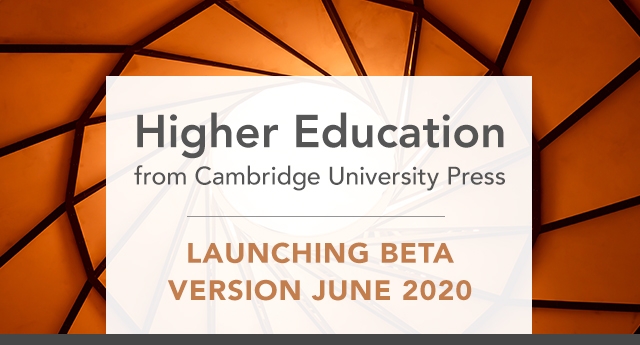Why are we launching Higher Education from Cambridge University Press?
Higher Education from Cambridge University Press is our new online textbook website, launched in August 2020.
In recent months Cambridge University Press has introduced a new set of strategies to support changing teaching and learning needs as higher education institutions prepare for a more digitally driven future in the wake of pandemic. Starting with free access to our HTML textbooks made available throughout spring, we decided to go further and provide a better reading and learning experience by launching the new Higher Education from Cambridge University Press website.
Digitalisation of education has sharpened all our senses by offering a variety of content formats to choose from, including video and audio lessons, interactive texts and infographics, and many more. Some types of content facilitate our understanding of theory while others work best for practical project learning. A combination of different types of content and texts with an improved online reading experience, is a powerful tool for learning. And this is why Cambridge University Press is launching the new Higher Education website, which pulls together all our premium teaching and learning content to benefit students, instructors and librarians.
Students
The new HTML reading experience allows for either reflowable or print replica content, depending on title. Anybody consuming the content will be able to highlight key passages and make notes alongside content regardless of the format.
One of the main features on the site is a powerful search function which allows students to quickly discover the content they need. Content is also broken down by subject area so that students and instructors can browse much more efficiently.
Recent events have highlighted how important it is for students to access learning materials remotely, without always having to go through their institutional websites. A key development of the new site is that students will now be able to access books offline while they are travelling or at home by logging on with a laptop, mobile phone or tablet. Students will, of course, still be able to access materials on campus via their institutions.
Instructors
According to Digital Projects Editor Dave Morris at Cambridge University Press, making relevant content discoverable for instructors is crucial. “Everything that instructors need when they are looking for material to use in teaching should be together in one place. This is why we’ve pulled together all the relevant information under the instructor tab at the top of the website, covering everything from requesting an examination copy, through to contacting sales representatives.”

Dave Morris
Librarians
Higher Education from Cambridge University Press offers a very similar experience to Cambridge Core. “We are trying to make it as simple as possible. Rather than making librarians work with two completely separate platforms we will ensure that there is one place where they can engage with our content and access all the backend information and statistics.” – says Dave. Cambridge Core and the Higher Education site will both be accessible via the same login for librarians, instructors and students alike.
It is important to us that we build a site that meets the needs of the academic community. As a result, the launch of Higher Education from Cambridge University Press has been divided into several stages so that we can garner feedback and build improvements into the site as it undergoes development.
The June 2020 version of the site is a beta launch with only a small number of our textbooks available online. We will be adding new features regularly for the next 6 months. “This includes audio, video and other supplementary materials and interactive content. Longer term we want that to include interactive questions at the end of chapters, animations, computational notebooks, or much richer experiences to suit the needs of digitally-native generations” – adds Dave.
Read more about Higher Education from Cambridge University Press here.





